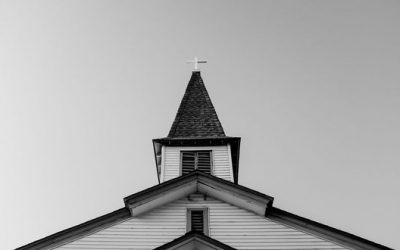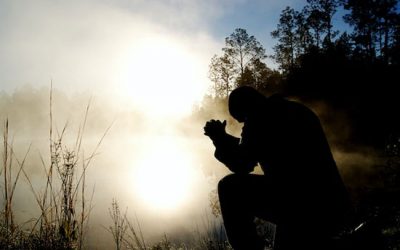Adventists observe and celebrate the seventh-day Sabbath from Friday evening (sunset) to Saturday evening. This is to acknowledge God as their Creator, grow in their relationship with Him, and rest from the cares of everyday life. They often gather for Sabbath worship services on Saturday mornings.
To understand how this all began, let’s look back at how God set Saturday apart as a special day to reconnect with Him and reflect upon His creation.
- Why the seventh day (Saturday) is special to God
- Why Saturday is special to Adventists
- Whether keeping Sabbath is works based
- Whether the day you worship on really matters
We’ll start by looking in the first book of the Bible.

Photo by Kalen Emsley on Unsplash
Why is Saturday special?
Saturday is special to God because it’s the day He sanctified and set apart in the Garden of Eden.
The Bible tells us that:
“God blessed the seventh day and sanctified it, because in it He rested from all His work which God had created and made” (Genesis 2:3, NKJV).
The “seventh day” refers to Saturday, according to both Hebrew and traditional Christian calendars.
The fact that God sanctified this day is significant. He made it holy and set it apart as a special day where people would rest from their work, just as He rested from His.
The Bible also tells us that Sabbath is meant to be a sign between us and God of our devotion to him (Ezekiel 20:20). Adventists believe keeping the Sabbath also serves as an acknowledgment of the creative work God did in making the Earth before He rested on the seventh day.
The verse about God establishing the seventh-day Sabbath at creation also tells us that celebrating Sabbath on Saturday wasn’t specifically created for only the Jews, but for all humanity.
There is a circulating assumption that the seventh-day Sabbath was done away with by the creation of the New Covenant. But the truth is, God’s command to keep the Sabbath wasn’t a part of the mosaic law or Jewish tradition, but a part of God’s unshakeable law—the Ten Commandments.
The Ten Commandments aren’t an arbitrary list of rules. They show us what it means to love God (the first four) and love others (the last six).
The fourth commandment about worshipping on Saturday is no different.
It’s a law that explains how we can express our love and devotion to God—by setting aside the day He declared holy.
God intended for Saturday to be a time for us to put aside our regular work and rest from our labor (Exodus 20:8-10). He did this so we can instead focus on spending time with Him, enjoying the world He created for us.
“Six days shall work be done, but the seventh day is a Sabbath of solemn rest, a holy convocation. You shall do no work on it; it is the Sabbath of the Lord in all your dwellings” (Leviticus 23:3, NKJV).
“Work” or “labor” in this context refers to our trades, the day-to-day business we participate in to make a living and support our households. It doesn’t mean we refrain from anything that takes any physical or mental effort. That’s not the focus.
One way to look at it is that we set aside “business” on the Sabbath.
That’s a big part of what “solemn rest” means. It’s not just catching up on sleep or taking it easy. It’s tapping into the profound rest God participated in after creating the world. He switched gears from “create” to “enjoy, reflect, appreciate.”
This kind of rest also makes it ideal for gathering together as family, or as a church family. Enjoying one another as fellow creations of our Creator God. That’s what’s behind the mention of “holy convocation,” or gathering together for a divine purpose.
All in all, Seventh-day Adventists worship together on Saturdays and observe the seventh-day Sabbath because it is a demonstration of our love to God.
Why is Saturday special to Adventists?
Saturday is special for Seventh-day Adventists because it was created by God for our benefit, and to regularly enrich our relationship with Him. It reminds us of God’s role as our Creator, and we take that weekly opportunity to focus on Him and what He’s done for us while resting from the stress of the daily life.
Adventists observe the Sabbath from Friday evening to Saturday evening because, if you’ll notice in the creation account, God counts a full day as being from evening to evening (Genesis 1:31; Genesis 2:2). This means that Sabbath begins as the sun goes down on Friday, and ends as the sun goes down on Saturday.
Seventh-day Adventists typically attend church services and Bible study (Sabbath school) each Saturday. But we also believe in worshipping God every day of the week, from Sunday to Saturday. God calls us to live lives of worship, bringing glory to Him in all the things we do.1
This daily worship can take various forms, such as personal devotions in the morning, evening worship with family, or even taking small moments during the day for reconnection through prayer.
Many Seventh-day Adventist institutions such as academies, universities, businesses, conference offices, and media outlets have worship with their co-workers before the work day begins.
There are Adventists churches that meet together in small groups for prayer on Sundays, Wednesdays, Fridays, or every day. Some church members gather in each others’ homes for worship or Bible studies during the week.
There are countless ways we can worship God. Our very lives can bring glory to Him as we’re led by the Holy Spirit.
But we believe worship on the Sabbath should be special. God told us to keep it holy, and so we observe the Sabbath by abstaining from work and focusing our attention on growing our relationship with God.
In a way, regularly abstaining from work is like a statement that says we are not made holy by our own works, but by relying on God. He is our sustenance. And it is through Him that we experience true rest.
The founders of the Adventist Church learned the truth of observing Saturday as the true day of worship in the 1840s from the Seventh-day Baptists. They helped us understand that it was still important to set aside a day devoted to worshipping God.
And the early Adventists’ continual, collective study of Scripture confirmed that truth. The seventh-day Sabbath was observed by Jesus Himself (Luke 4:16), and by His believers all throughout the Bible (Mark 15:42-47; Acts 13:14-17; 16:13; 17:2; 18:4).
Is keeping Sabbath considered works-based?
Observing the seventh-day Sabbath is part of God’s law, the Ten Commandments. We keep the Sabbath described in the fourth commandment just like we’d keep any of the other nine.
Keeping God’s commandments isn’t about “works” unless one keeps them for the purpose of earning salvation on their own. Just as we keep the other commandments out of love for God and in recognizing His wisdom and guidance, keeping the Sabbath is not about “works” but about remembering who He is. It’s about resting in Jesus and His grace.
God wants us to keep the Sabbath because we love Him and trust that His laws are only designed to enrich our lives and bless us. He never wanted us to keep it out of obligation, fear, or to “appear” holy.
And yet, many have misunderstood what the Sabbath is truly about. Some have even twisted its meaning as a way to control their communities and make themselves feel more holy than others:
In Jesus’ time, the Pharisees made strict rules about how their fellow Jews should keep the Sabbath. This caused a lot of people to see the Sabbath as a day of strict religious ceremony, instead of a sacred and joyful occasion to spend time with God.
But Jesus explained that God never intended for Sabbath to be kept with the staunch legalism of the Pharisees. He told them that the Sabbath wasn’t meant to be a burden but a blessing, stating that the Sabbath was created for man, not the other way around (Mark 2:27).
When we keep the Sabbath as God commanded, we recognize the Sabbath isn’t something we keep to earn favor from God. It’s something God gave us for our own benefit, so we could grow in our relationship with Him.
In fact, one of the main reasons God created the Sabbath for us is so we could grow in our relationship with Him and others. In this way, Saturday can be an opportunity for us to serve others, spend time with loved ones, and commune with fellow believers at church.
He also created it so we could rest from the cares of everyday life.
And besides simply being pleasant, He knew this rest would benefit us in numerous ways.
Resting helps us recuperate after six days of work. It gives us the opportunity to refresh our strength, relax our minds, and put aside the pressure and stress that comes with our busy lives.
The Lord calls for anyone who is weary and burdened to come to Him for rest (Matthew 11:28).
In Hebrews 4:10 we read:
“He who has entered His rest has himself also ceased from his works as God did from His” (NKJV).
Overall, Sabbath rest reminds us that in Jesus we have rest—we are saved by His righteousness and not by our works. And because we are saved by His righteousness alone, He gives His people grace and power to keep His commandments in the very way He asks us to.
Does it matter which day is the Sabbath?
Yes, the Sabbath day was specifically instituted by God to be on Saturday, the seventh day of the week.
To keep the Sabbath on any other day than Saturday is to deny what the Bible has to say about the subject. It is to reject God’s sanctification of Saturday at creation, and God’s commandment to keep that day holy.
Think about a husband and wife who celebrate their anniversary every year. Every day of the year, they show love to each other but they recognize that their wedding anniversary is a special day. They celebrate on that day as an expression of their love and devotion to each other.
Now suppose the wife decided that she wanted to change the anniversary date. Instead of celebrating on September 17th, she changes her anniversary date to September 18th. Despite her preference or reasoning, her anniversary would always be on September 17th.
At the end of creation, on the seventh day, the Bible tells us that:
“God completed His work which He had done, and He rested on the seventh day from all His work which He had done. Then God blessed the seventh day and sanctified it because He rested from all His work which God created and made” (Genesis 2:2-3, NASB).
The Bible is clear. God set apart Saturday as His special Sabbath. He consecrated it, asking us to keep it to honor and spend time with Him so we could enjoy the blessings that come with Sabbath rest.
Would you like to learn more about what this special day is like? Check out, “Rest and Reconnection: What it Really Means to Keep the Sabbath.”
- Psalm 34:1; Romans 12:1; 1 Corinthians 10:31; Colossians 3:17; 1 Thessalonians 5:16-18 [↵]
More Answers
What Do Adventists Believe About the Mark of the Beast and 666?
It’s a popular topic, especially during tumultuous times. When everything around you feels chaotic, it’s easy to wonder about the end of the world, and topics like the mark of the beast, as mentioned in Revelation 13, can stir up uneasiness.
What Do Adventists Believe About the Atonement?
If you’ve spent much time in the Bible books of Leviticus or Numbers, you might’ve noticed the word atonement.
Who Changed the Sabbath to Sunday?
If the Bible never mentions the change of the Sabbath, why do so many today attend church on Sunday?
How Adventists Developed the Sanctuary Doctrine and What It Means
The sanctuary was a building at the center of ancient Israelite society that gives us a small picture of the original sanctuary, God’s throne room in heaven (Hebrews 8:1-2).
What Do Adventists Believe About Faith and Works?
Adventists believe we are saved by faith, which is the belief and trust we have in Jesus to save us from our sins. Jesus, then, enables us to live in harmony with God’s commandments and serve others with love—sometimes referred to as “works.”
What Day Is the Sabbath, and How Do We Know?
The Sabbath is a declaration of weekly rest by God which we find in the Bible (Genesis 2:2-3). But you may be wondering:
Sabbath Keeping: What It Looks Like in the Bible
That Sabbath would not be about a checklist of rules but about a mindset of rest. It’s a day to set aside daily cares and connect with God, our Creator. Out of our love for Him, we take the principles of the Bible and apply them in the way we keep the Sabbath.
Is it necessary to attend church to draw closer to Christ?
What Does the Bible Say About Going to Church?While you certainly don’t have to go to church to develop a relationship with Jesus, the Bible makes it clear that gathering together with other believers can be really beneficial for your spiritual growth. For the early...
Do Seventh-day Adventists Believe in the Secret Rapture
The secret rapture belief asserts that the followers of Jesus will be suddenly and stealthily “raptured” from earth and taken to heaven. Then, any people left on earth will face a period of great difficulty—before Christ’s second coming actually happens.
Rest and Reconnection: What It Really Means to Keep the Sabbath
The Bible tells us that we keep the Sabbath by avoiding work. God made this law because he knew it would strengthen us and bring us joy, as well as give us time to reconnect with Him and recharge from our busy lives.
Why is the Sabbath Observed from Sunset to Sunset?
If you know of any Adventists, you may have noticed that they stop their work or business activities before sundown on Friday. What’s the reason behind this?
What Seventh-day Adventists Believe About Growing in Christ
Christian growth is the experience of allowing Jesus Christ to work in our lives through the Holy Spirit and restore in us the image we were designed for—God’s image of selfless, other-centered love.
What Do Seventh-day Adventists Believe about the New Earth?
Seventh-day Adventist, like other Christians, believe that after the second coming of Christ, God will cleanse our earth by fire and then restore it back to Eden-like perfection.
What Adventists Believe About the Millennium and the End of Sin
As most Christians, Seventh-day Adventists hope for the time when sin and evil will no longer exist. The Bible teaches that God will bring an end to sin after a thousand-year period of time called the millennium.
What Are Seventh-day Adventists Beliefs on Death and the Resurrection?
The thought of dying can seem scary. And the idea of being resurrected—or coming back to life—can seem a little uncomfortable.
What Do Seventh-day Adventists Believe about The Second Coming of Christ?
The second coming of Jesus Christ is an event the Bible prophesies will occur at the end of this world’s history. It’s called His second coming to distinguish it from His first, when Jesus was born to Mary and lived as a human before dying on the Cross.
What Adventists Believe About Jesus’ Ministry in the Heavenly Sanctuary
What is Jesus doing right now?
What do Seventh-day Adventists Believe about Marriage and Family?
The Seventh-day Adventist Church believes God established marriage and the family unit to be blessings to humanity. They make up a relational structure that can reflect the multifaceted nature of God’s love.
What Seventh-day Adventists Believe about Christian Behavior
The patterns of actions and words that make up behavior are central to any type of belief system because they flow from those beliefs. Seventh-day Adventists look to the Bible, with Jesus as the perfect example, for guidance on shaping our daily behavior.
What do Seventh-day Adventists Believe about the Sabbath?
Seventh-day Adventists believe that the biblical Sabbath is a beautiful gift of rest that God gave to us at Creation and that remains valid to this day. Falling on the seventh day of the week—Saturday—it connects us to God in a special way and offers us a weekly opportunity to be physically, mentally, and spiritually refreshed.
What Seventh-day Adventists Believe about Stewardship (and What Does It Mean?)
Love for God and our fellow humans is the overriding principle of the Seventh-day Adventist faith. And we express that love in an overarching way through how we manage the things—material and immaterial—that God has entrusted to us.
What Do Adventists Believe About the Law of God?
Seventh-day Adventists believe that God’s law reflects His character of love (1 John 4:8; Romans 13:10). It is perfectly summarized in the Ten Commandments given to Moses on Mount Sinai, showing us the practical application of loving God and loving other people.
What Do Seventh-day Adventists Believe About the Gift of Prophecy?
Adventists believe the gift of prophecy is a spiritual gift that the Holy Spirit gives to specific individuals to help the church carry out Jesus’ Great Commission (Matthew 28:16–20). Prophecy helps strengthen, encourage, and comfort His people (1 Corinthians 14:3).
What Seventh-day Adventists Believe About Spiritual Gifts in the Bible
Seventh-day Adventists believe that spiritual gifts are talents that the Holy Spirit gives to believers and followers of Jesus Christ. These gifts are different but complementary, and they often equip followers of Christ with the ability to spread the good news about Jesus and encourage its members.
What do Seventh-day Adventists Believe about the Lord’s Supper (Communion)?
Like many Protestant Christians, Seventh-day Adventists believe in the practice commonly called the Lord’s Supper or Holy Communion. They drink grape juice and eat unleavened bread in obedience to Jesus’ direct instructions to do it in remembrance of Him (1 Corinthians 11:24–25).
What do Seventh-day Adventists Believe about Baptism?
Like many Protestant Christians worldwide and throughout history, the Seventh-day Adventist Church believes in baptism, a ceremony in which individuals go under water to publicly demonstrate dying to an old life and beginning a new life in Christ. We baptize people by immersion, as taught and exemplified in the Bible.
What Do Seventh-day Adventists Believe about Unity in Christ?
Seventh-day Adventists believe in biblical unity—the idea of believers in Jesus being united by the truth of the Bible and the common goal of representing God and His love to the world.
What do Seventh-day Adventists Believe about the Remnant and its Mission?
The “remnant” are a group of faithful believers that have existed throughout history and proclaimed God’s truth, love, and plan to save humanity. They “remain” with God even amid persecution and also when it seems everyone else has rebelled against God or compromised their beliefs.
What do Seventh-day Adventists Believe about the Church?
Seventh-day Adventists believe that the idea of the church is an important biblical concept.
Didn’t find your answer? Ask us!
We understand your concern of having questions but not knowing who to ask—we’ve felt it ourselves. When you’re ready to learn more about Adventists, send us a question! We know a thing or two about Adventists.





























